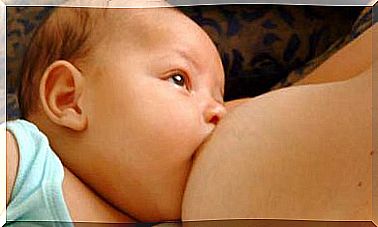Excessive Hunger During Pregnancy

Excessive hunger in pregnancy is an aspect that must be controlled. It’s never healthy to eat without limits. Excess weight and other conditions that accompany this behavior can impede the normal development of the baby, as well as causing disturbances in the mother.
Obstetricians advise caution when a woman talks about her excessive hunger during pregnancy. They know that if these desires are not controlled and channeled in time, the pregnant woman’s situation can get complicated.
When does excessive hunger appear in pregnancy?
Each woman can experience different types of pregnancy, depending on different parameters. It is possible that in some women excessive hunger appears and in others it does not.
When excessive appetite appears, the desire to eat is continuous. From the moment she gets up and goes to bed, the woman is thinking about eating and looking for some food. Even if the mother-to-be has already eaten or dined, she immediately wants to continue eating.
This desperate urge to eat can occur at very different stages of pregnancy. There are pregnant women who already experience them in the first trimester. However, hunger usually appears between the second and third trimesters of pregnancy, that is, when the pregnancy is already advanced.
Wrong beliefs about excessive hunger in pregnancy
Over time, this exaggerated appetite was associated with different explanations. There are popular beliefs that have nothing to do with scientifically proven reality:
- One of these beliefs is based on the size of the baby growing in the womb. They say that very big babies need a lot of food. Therefore, the mother would have to eat constantly to satisfy this demand.

- There are people who associate it with permanent desires. They even say that you have to satisfy these desires so that the child doesn’t have ‘marks’. The consequence is that the family environment is concerned with collaborating so that the woman who feels excessive hunger is satisfied and is always eating.
- There are women who think they need to “eat for two”. This belief has a psychological effect that causes excessive hunger in pregnancy. The woman eats her portion of food and another to ensure the child’s growth. So she becomes obsessed with providing the baby with all the nutrients for its healthy development.
These are all myths without any real basis. Excessive hunger has nothing to do with the size of the developing baby or the cravings it causes in the mother.
What are its real causes?
Excessive hunger in pregnancy arises, in part, from the psychological effect all these erroneous beliefs have on women.
Pressure and social influence are also very important, as we have seen. People close to the pregnant woman give her advice, suggest “the best” for her and the baby. The question “Are you eating well?” appears several times a day.
In addition to these psychological reasons, there are physiological reasons. Hormones, especially estrogens, play a decisive role in the onset of hunger attacks in pregnant women.
During pregnancy, the placenta secretes estrogen. These hormones cause states of anxiety and nervousness and are the cause of binge eating, such as overeating.
In this state of nervousness and generalized compulsion, the pregnant woman overeats. Appetite is linked to foods that she herself was prohibited from consuming before pregnancy for following a healthy diet. You experience what is called “freedom from deprivation” and consume many unwanted foods for a healthy diet.

How to control excessive hunger in pregnancy?
A balanced diet is always a determining factor for both baby and mother. Don’t forget that an exaggerated increase in weight can cause gestational diabetes, which appears in pregnant women.
What can you do so that hunger attacks don’t cause problems? It is essential to choose food well. Avoid refined sugars and processed sweets. Likewise, it is necessary to prioritize the consumption of foods that reduce appetite without getting fat: cereals, bananas, vegetables rich in fiber and fruits.
It’s also important to keep your head occupied. If a pregnant woman spends all day at home thinking only about her pregnancy, anxiety will increase. Finally, of course, consulting a nutritionist can always help.








